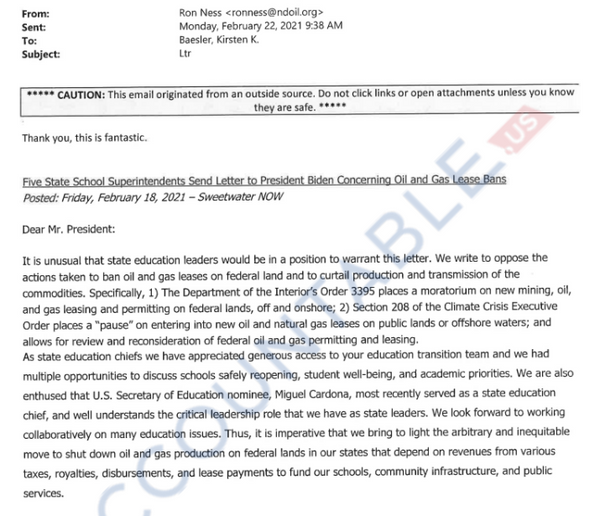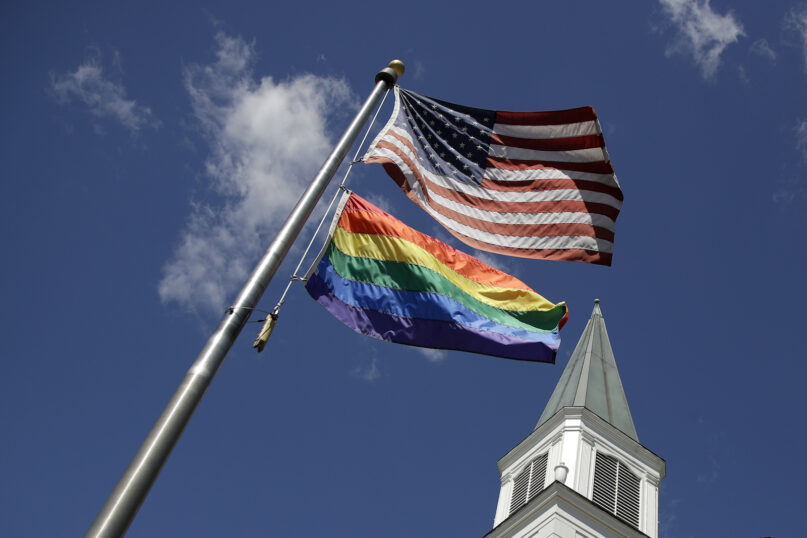State school chiefs wrote "unusual" and "absurd" letter to Biden, clearly based on oil industry talking points
By IGOR DERYSH
MARCH 24, 2021

Oil and gas industry advocates were involved in an "unusual" effort by five top state education officials to stoke economic fears about President Joe Biden's climate policy, according to internal emails reviewed by Salon.
The American Petroleum Institute, the largest trade organization representing the oil and gas industry, and its allies have gone on the offensive against Biden's early executive orders, which included a temporary but indefinite moratorium on new gas and oil leases on federal land. API has framed the order as a "ban," which is misleading at best, since it applies only to new leases. New drilling permits are still being awarded under existing leases, and the industry is sitting on millions of acres of leased but unused land.
Internal emails show that the API's allies were involved in crafting a self-described "unusual" letter signed by five Western state school superintendents to Biden, which was later published as an op-ed. The letter raised concerns that the moratorium would cost thousands of jobs and hundreds of millions of dollars in revenue that could impact education funding, relying heavily on misleading data from an API report written before Biden was even elected.
The emails show that the North Dakota Petroleum Council, a former division of API that has grown into a standalone organization, sent data to one of the superintendents and later thanked her for the "fantastic" op-ed. API later promoted the superintendents' talking points on social media, though it did not mention that it supported the Trump administration's cuts in oil royalties that had made up a much larger share of industry revenue distributed to states that helps fund education.
The letter immediately set off alarm bells among industry experts.
"That letter was clearly drafted for them and they were just asked to sign it," Mark Squillace, a former Interior Department official who is now a professor of natural resources law at the University of Colorado Law School, concluded in an interview with Salon. "I don't know what they actually know about oil and gas revenues, but the idea that hundreds of millions of dollars are going to be lost by the states is just ridiculous. It's absurd."
Squillace added that he has never previously seen the oil industry work with elected state education officials to push "misleading" claims.
"Obviously, the education sector is going to be more sympathetic" to the public than the oil and gas industry, he said, "so it was clearly an interesting tactic. But it's fairly dishonest, or at least misleading, for them to be putting out that kind of information and broadly suggesting that a leasing moratorium is somehow going to cost the state all this money. The leasing moratorium is not going to do that. It's going to have a nominal impact."
Advertisement:
The emails were obtained through a public records request by the progressive government watchdog group Accountable.US and the Climate Power Education Fund, which on Wednesday launched "Polluters Exposed," a joint initiative aimed at holding API and its allies "accountable for decades of spreading misinformation" about climate and pollution.
"Oil and gas executives love to talk about working with the Biden administration to address climate change, but these documents show behind closed doors they are actively working to undermine that very effort," said Kyle Herrig, president of Accountable.US. "Polluters Exposed will shine a light on Big Oil and show the American people how industry lines its pockets by spreading misinformation and corrupting policymakers."
Advertisement:
The groups accused the oil industry's top advocates of helping "orchestrate a scheme to use public schools as a Trojan horse" to attack the administration's climate policy.
"They have zero shame. API and their allies should stop using our teachers and schools to halt progress on climate action. Our children will pay the price for these lies," Lori Lodes, executive director of Climate Power Education Fund, said in a statement. "The days of the American Petroleum Institute and its allies lying with impunity are over. Americans deserve the truth and we are going to give it to them."
An API spokesperson denied any involvement with the letter.
Advertisement:
"These individuals are entitled to their own opinion, and highlight many valid points about the real, serious impact a long-term federal leasing and development ban would have on education in their communities. Their concerns about school funding should be taken seriously," the spokesperson said in a statement to Salon, adding that New Mexico Gov. Michelle Lujan Grisham, a Democrat, and the state's two Democratic senators, Martin Heinrich and Ben Ray Luján, have expressed "similar concerns," though they had largely expressed concerns that energy firms would move to states with more private land available, like Texas.
"Our industry believes it's important all the facts and potential effects be considered when crafting policy," the spokesperson added. "The NDPC is not a part of API, but they, the superintendents, and others are free to cite the publicly posted information on our website."
API has vowed to deliver "solutions that reduce the risks of climate change" and even plans to endorse a carbon pricing plan to help meet the Paris climate accord's targets, even though it fiercely opposed such legislation for the past decade, according to a draft statement obtained by The Wall Street Journal. API president and CEO Mike Sommers told the Washington Examiner that he is "optimistic" and "hopeful" that the group will have a "seat at the table to discuss these big issues" with the administration. But days after Biden took office, Sommers attacked the lease moratorium, framing it as a "federal leasing and development ban" even though the order did not apply to existing operations and Biden has repeatedly made a point of vowing not to ban drilling. Sommers warned that such a "ban" could result in significant cuts to state funding that supports schools.
That same week, Kristen Hamman, director of regulatory and public affairs at the North Dakota Petroleum Institute, sent North Dakota State Superintendent Kirsten Baesler an email sharing data claiming that an oil and gas lease ban would cost her state thousands of jobs, $600 million in tax revenue, and $750 million in personal income over the next four years.
"Ron wanted me to send you some ND stats on oil impacts," Hamman wrote, referring to Ron Ness, the group's president, who was copied on the email.
"Thank you, Kristen!" Baesler replied. "This is very helpful."

Advertisement:
The following month, the "unusual" letter to Biden signed by Baesler, along with Wyoming State Superintendent Jillian Balow, Montana State Superintendent Elsie Arntzen, Utah Superintendent Sydnee Dickson and Alaska State Commissioner Michael Johnson, contained the exact figures shared by Hamman.
"In North Dakota, the lease moratorium would result in 13,000 lost jobs over four years, along with $600 million in lost tax revenue and a $750 million loss in personal income," the letter said. "North Dakota's oil and gas industry accounts for 24,000 direct jobs in the state."
Ness followed up with Baesler a few days later.
"Thank you, this is fantastic," he wrote.

Baesler told Salon the North Dakota data did not come from an API report but an analysis by a researcher at the University of Wyoming, and denied that she had coordinated with oil and gas industry advocates.
"State school chiefs in Western energy-producing states coordinated their efforts on this letter," she said in an email. "We are rightly concerned about the Biden administration's open hostility to domestic energy production, and its effects on energy income that our states rely upon for educating our young people. The president's approach to our states' resources is not only reflected in his executive orders affecting energy, but also his action to stop the Keystone XL pipeline project, which as envisioned would carry oil production from Alberta and western North Dakota to refineries to the east and south."
Baesler cited reports predicting that the moratorium is "widely viewed as a precursor to a more permanent ban" and disputed that Biden's order would not affect existing operations.
Advertisement:
Representatives for Balow, the letter's lead signatory, and Johnson also denied they had "coordinated" with representatives of the oil and gas industry. Dickson and Hamman did not respond to questions from Salon.
"Coordinate, no," Linda Finnerty, a spokesperson for Balow, said in a statement to Salon. "We maintain relationships with industries of all types and routinely ask for information, clarification, and data."
Finnerty pointed to a letter from Wyoming Gov. Mark Gordon to the Interior Department disputing that the order did not affect existing operations. Gordon argued in his letter that the order had resulted in a slowdown of permitting for existing leases, despite denials from the department.
"'Moratorium' is a misnomer," Finnerty insisted.
"The leasing "pause" – which appears to be indefinite - discourages the pursuit of continued energy independence for the United States," Sharyl Allen, a spokesperson for Arntzen, said in a statement to Salon.
But Hannah Wiseman, a law professor and faculty fellow at Penn State's College of Earth and Mineral Sciences, said the superintendents' data was based on revenue that was unaffected by the moratorium.
"The superintendents are using the royalty numbers from oil and gas wells on lands that are already leased and producing and translating those numbers into job losses," she said in an email. "But the moratorium on new leases does not order existing production to shut down; the royalties that states are already receiving to fund schools and other essential programs are not affected."
The letter falsely described Biden's temporary halt on new leases as "actions taken to ban oil and gas leases."
"It is imperative that we bring to light the arbitrary and inequitable move to shut down oil and gas production on federal lands in our states that depend on revenues from various taxes, royalties, disbursements, and lease payments to fund our schools, community infrastructure, and public services," the letter said.
The superintendents repeatedly cited data from the API study, echoing its claims that a ban would cost 13,300 jobs in Wyoming, 3,300 jobs and $30 million in revenue in Montana, 11,000 jobs and $72 million in revenue in Utah, and 3,500 jobs and $24 million in Alaska.
Industry experts said the data was highly misleading.
"The 'costs' mentioned in the letter, or in some other studies, assume not just a pause on new leases, but rather a long term cessation in oil and gas operations," Brad Handler, a former Wall Street analyst covering oilfield services and drilling who now serves as a senior fellow at the Payne Institute for Public Policy, said in an email.
"What the Biden administration has implemented is a temporary (albeit of undefined duration) pause on issuing new leases on public (federal) lands," he continued. "The Department of Interior has been directed to conduct a review of leasing and management policies. … The executive action makes clear that permitting and extraction operation can continue on existing leases. Thus, broadly there is almost no impact on employment or state revenues in the near to medium term as a result of this action."
API later promoted the superintendents' talking points on Twitter, citing a quote from Balow claiming that Biden's moratorium was a "lockdown of an industry our students in Wyoming really depend on."
The API report, which was compiled last September, was based on a hypothetical "federal leasing and development ban." But Biden's executive order does nothing even close to that. It pauses new leases while requiring nearly a third of federal lands to be conserved over the next decade.
In fact, Reuters noted that the order only affects "leasing activities, and not permitting, raising the possibility that the government could resume providing drilling permits to those who picked up leases in a series of auctions held in the waning days of the Trump administration."
The Interior Department approved 33 such permits in the week following Biden's leasing pause, Bloomberg News reported. The oil and gas industry also has a stockpile of 7,700 unused leases, according to the Interior Department, leaving more than 13.9 million acres of public land available for drilling operations without any new leasing.
"Since President Biden's Executive Order directing a review of the federal oil and gas program and pause on new leasing, API has been very clear that our concern is that this action is the first step towards a long-term federal leasing and development ban," an API spokesperson told Salon. "Our analysis was released in September 2020, and was not in response to Biden's EO. It found that should a long-term ban be implemented it would shift the U.S. to foreign energy sources, cost nearly one million American jobs, increase CO2 emissions and reduce revenue that funds education and key conservation programs."
Squillace said the industry was manipulating and distorting the issue in order to attack the administration, even though Biden's order will have little impact on revenues.
"This is a really bad time to be leasing federal oil and gas because the price has been historically low," he said, adding that demand for new leases has been so low that most are now auctioned at the minimum bid price of $2 an acre. "That doesn't suggest a robust market for oil and gas leases. This is just a big industry making it out to be a lot more than it is."
Squillace said that if education officials were actually interested in boosting revenues for schools, they would support increasing the minimum bid prices as well as other revenue streams from oil and gas drilling operations.
Most of the money schools receive from public lands comes from royalties on oil and gas production, though states also get revenue from rents, bonuses and potential penalties, according to the Interior Department. Bonuses, which are payments associated with winning bids on lease sales, are the only revenue even theoretically impacted by Biden's pause. Most revenue comes from royalties, which are calculated as a percentage of the sales value of any oil produced by the drilling operations. Although revenue from bonuses increased as the Trump administration awarded a large number of new leases, royalties make up the vast majority of revenue collected by states, according to the Congressional Research Service.
The Trump administration last year drastically cut royalty rates, which had provided states a total of $2.9 billion in revenue in 2019. In Superintendent Dickson's state of Utah, the Bureau of Land Management cut standard royalty rates of 12.5% to as low as 0.5%, according to E&E News. BLM said the move was temporary, but House Natural Resources Committee Chairman Raúl Grijalva, D-Ariz., called for an investigation into to determine how much the change would cost in revenue and whether the cuts were necessary and properly handled.
Accountable.US and the Climate Power Education Fund argued in a news release that the oil industry's "feigned worry about school budgets is hypocritical" given that the industry had enthusiastically supported the Trump administration's move to slash oil and gas royalty rates, "costing states and schools untold millions during the height of a pandemic when they needed it most."
Unlike the concern raised by superintendents, Trump's order "involved a direct reduction in royalty revenues as opposed to a speculative one," Wiseman told Salon.
"These oil and gas royalties are an integral component of many western states' budgets, and suspending their collection would have a direct negative effect on states," the Western Governors' Association warned then-Interior Secretary David Bernhardt, a former oil lobbyist, in April of 2020.
"This is a ludicrous outcome that provides an extremely generous subsidy to the oil and gas industry while robbing taxpayers and states of valuable revenue," Grijalva argued in his own letter to Bernhardt.
The Government Accountability Office concluded last October that BLM had botched the royalty cut, failed to determine whether the policy — which cost taxpayers around $4.5 million at the time — was actually necessary and said it may have resulted in cuts for oil wells that did not need it.
Despite data showing the overwhelming share of revenue coming from oil and gas operations is from royalties, Finnerty, the Wyoming superintendent's spokesperson, argued that "royalties are only part of the revenue realized from oil and gas."
"Leases, bonuses, and other forms of indirect revenue are also in play," she said. "The overall economic impact of oil and gas activity is very significant."
Allen said in a statement that "a comparatively small number of producing wells are subject to this lawful reduction, which, in this time of the Covid pandemic, will assist in preserving jobs, supporting families, communities and critical infrastructure, i.e. schools."
Grant Robinson, a spokesperson for Johnson, acknowledged in an email that "bonuses from lease sales generate less revenue for the state than royalties" but noted that Trump's policy was a temporary one — as is Biden's new policy.
Baesler denied that Trump's policy posed a greater threat than Biden's but acknowledged that most of the state's oil and gas revenues come from royalties. Still, she said, "the Biden administration's anti-energy policies pose a much greater threat to education funding than any action taken by the Trump administration."
Squillace rejected that argument and said it was ironic that education officials had not raised similar concerns when Trump reduced the royalty rate.
It was "so absurd," he said, that states would complain about "this silly little moratorium when they said nothing about the royalty relief package Trump put into effect. I mean, it just boggles the mind."
IGOR DERYSH
Igor Derysh is a staff writer at Salon. His work has also appeared in the Los Angeles Times, Chicago Tribune, Boston Herald and Baltimore Sun.












